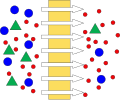Microfiltration
Microfiltration is a process in the field of filtration that involves the physical separation of solids from fluids (liquids or gases) by passing the fluid through a microporous membrane. The size of the pores in the membrane determines the extent to which suspended particles, microorganisms, and other substances can be removed. Typically, microfiltration membranes have pore sizes ranging from 0.1 to 10 micrometers (µm). This technology is widely used in various industries, including water treatment, food and beverage processing, pharmaceuticals, and biotechnology, for applications such as sterilization, clarification, and cell harvesting.
Principles of Microfiltration
Microfiltration operates on the principle of physical size exclusion. Particles larger than the membrane pores are retained on the membrane surface or within the pores, while the fluid and smaller particles pass through as the permeate. The process can be driven by gravity, pressure, or vacuum, with pressure-driven processes being the most common. The effectiveness of microfiltration is influenced by factors such as membrane material, pore size, operating pressure, and flow rate.
Applications
Water Treatment
In water treatment, microfiltration is used to remove suspended solids, bacteria, protozoa, and some viruses from water, making it an essential step in the production of potable water. It is also employed in wastewater treatment to reduce turbidity and for the recovery of valuable materials.
Food and Beverage Processing
Microfiltration is applied in the food and beverage industry to clarify beverages, such as wine and beer, by removing yeast and other particulates. It is also used in the dairy industry for the removal of bacteria from milk and the concentration and fractionation of proteins.
Pharmaceuticals
In the pharmaceutical industry, microfiltration is utilized for the sterile filtration of drugs, vaccines, and other therapeutic products. It ensures the removal of microorganisms and particulate matter, meeting regulatory requirements for product safety.
Biotechnology
Microfiltration plays a crucial role in biotechnology for the separation and purification of biomolecules, cell harvesting, and media preparation in bioprocesses.
Membrane Materials
Microfiltration membranes can be made from a variety of materials, including polymers (e.g., polyethersulfone, polyvinylidene fluoride) and ceramics. The choice of material depends on the application, considering factors such as chemical compatibility, thermal stability, and mechanical strength.
Advantages and Limitations
Microfiltration offers several advantages, including low energy consumption, the ability to operate at ambient temperatures, and the preservation of the biological and chemical integrity of the permeate. However, membrane fouling, which can reduce efficiency and increase operational costs, is a significant limitation. Regular cleaning and maintenance are required to mitigate fouling and prolong membrane life.
Future Directions
Research in microfiltration technology focuses on developing advanced membranes with higher selectivity, reduced fouling, and improved durability. Innovations in membrane materials and configurations aim to enhance performance and expand the range of applications.
Microfiltration gallery
Transform your life with W8MD's budget GLP-1 injections from $125.
W8MD offers a medical weight loss program to lose weight in Philadelphia. Our physician-supervised medical weight loss provides:
- Most insurances accepted or discounted self-pay rates. We will obtain insurance prior authorizations if needed.
- Generic GLP1 weight loss injections from $125 for the starting dose.
- Also offer prescription weight loss medications including Phentermine, Qsymia, Diethylpropion, Contrave etc.
NYC weight loss doctor appointments
Start your NYC weight loss journey today at our NYC medical weight loss and Philadelphia medical weight loss clinics.
- Call 718-946-5500 to lose weight in NYC or for medical weight loss in Philadelphia 215-676-2334.
- Tags:NYC medical weight loss, Philadelphia lose weight Zepbound NYC, Budget GLP1 weight loss injections, Wegovy Philadelphia, Wegovy NYC, Philadelphia medical weight loss, Brookly weight loss and Wegovy NYC
|
WikiMD's Wellness Encyclopedia |
| Let Food Be Thy Medicine Medicine Thy Food - Hippocrates |
Medical Disclaimer: WikiMD is not a substitute for professional medical advice. The information on WikiMD is provided as an information resource only, may be incorrect, outdated or misleading, and is not to be used or relied on for any diagnostic or treatment purposes. Please consult your health care provider before making any healthcare decisions or for guidance about a specific medical condition. WikiMD expressly disclaims responsibility, and shall have no liability, for any damages, loss, injury, or liability whatsoever suffered as a result of your reliance on the information contained in this site. By visiting this site you agree to the foregoing terms and conditions, which may from time to time be changed or supplemented by WikiMD. If you do not agree to the foregoing terms and conditions, you should not enter or use this site. See full disclaimer.
Credits:Most images are courtesy of Wikimedia commons, and templates, categories Wikipedia, licensed under CC BY SA or similar.
Contributors: Prab R. Tumpati, MD




